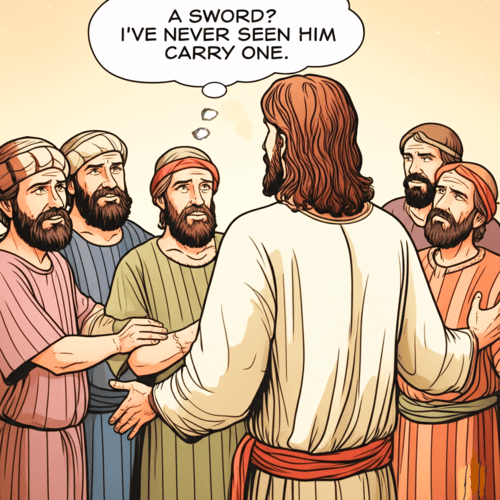I Want To Believe, But Can’t: What Do I Do?
“I want to believe in God. I really do. But I just can’t seem to make it happen. I’ve tried reading the Bible, going to church, even praying—but faith feels impossible. What’s wrong with me?”
This honest confession echoes through countless hearts, often accompanied by shame and frustration. But what if the problem isn’t our lack of effort? What if faith isn’t something we manufacture—but something God gives?
FAITH: GOD’S GIFT, NOT OUR ACHIEVEMENT
The Reformed tradition teaches faith originates not in human will, but in divine grace. The Westminster Confession (14.1) declares faith is “the work of the Spirit of Christ in the hearts” of believers.
Paul writes, “By grace you have been saved through faith. And this is not your own doing; it is the gift of God, not a result of works, so that no one may boast” (Ephesians 2:8-9). The phrase “this is not your own doing” encompasses the entire salvation experience, including faith itself. Even more explicitly, Philippians 1:29 states it has been “granted” to believers not only to suffer for Christ, but “to believe in him.”
This truth should lift a crushing weight off our shoulders. Our inability to conjure faith through willpower doesn’t indicate spiritual failure—it reveals the nature of faith itself. We cannot bootstrap our way into belief any more than we can lift ourselves by tugging at our shoelaces.
BIBLICAL HONESTY ABOUT DOUBT
Scripture validates rather than condemns honest doubt. Consider the desperate father in Mark 9 who brought his demon-possessed son to Jesus. When Christ challenged him to believe, the man cried out, “I believe; help my unbelief!” (Mark 9:24). Jesus didn’t rebuke this contradiction—He healed the boy.
King David, the man after God’s own heart, poured out his spiritual desolation in Psalm 42: “Why are you cast down, O my soul, and why are you in turmoil within me?” The prophet Habakkuk boldly questioned God’s justice: “How long, O Lord, must I call for help, but you do not listen?” (Habakkuk 1:2). Even John the Baptist, whom Jesus called the greatest born of women, sent messengers from prison asking, “Are you the one who is to come, or shall we look for another?” (Matthew 11:3).
Most remarkably, Thomas—now unfortunately nicknamed “Doubting Thomas”—declared he wouldn’t believe unless he could touch Christ’s wounds. Jesus appeared and invited Thomas to do exactly that, responding to doubt not with condemnation but with patient evidence (John 20:24-29).
God honours honest seekers more than pretend believers. Our spiritual struggle may actually demonstrate more integrity than artificial certainty.
THE HOPE OF IRRESISTIBLE GRACE
Here’s where Reformed theology offers unparalleled comfort: the doctrine of irresistible grace teaches God’s calling is effectual. When God truly draws someone to Himself, that work will be completed.
Jesus declared, “All that the Father gives me will come to me” and “No one can come to me unless the Father who sent me draws him” (John 6:37, 44). Paul assured the Philippians, “I am sure of this, that he who began a good work in you will bring it to completion at the day of Jesus Christ” (Philippians 1:6). The same chapter of Romans that describes our calling also promises our justification: “Those whom he called he also justified” (Romans 8:30).
This means our very desire to believe—even accompanied by inability—may be evidence of God’s drawing work in our hearts. The Reformed understanding suggests God doesn’t abandon His work halfway through. If He has begun to stir spiritual hunger in us, He will satisfy it.
PRACTICAL STEPS FOR THE STRUGGLING SOUL
While faith is God’s gift, He typically works through ordinary means. Let’s consider these practical steps:
Let’s immerse ourselves in Scripture. Romans 10:17 teaches that “faith comes from hearing, and hearing through the word of Christ.” God’s Word carries inherent power to create what it describes.
Let’s pray with honesty. David prayed, “Search me, O God, and know my heart; test me and know my anxious thoughts” (Psalm 139:23). God already knows our doubts—honest prayer invites His help rather than hiding from His knowledge.
Let’s engage with Christian community. Hebrews 10:24-25 encourages believers to “consider how to stir up one another to love and good works.” When your faith feels weak, let others carry you.
Let’s practice patient waiting. Isaiah 40:31 promises “those who wait for the Lord shall renew their strength.” Sometimes faith develops slowly, like dawn gradually breaking rather than a light switch flipping on.
THE PROMISE OF PERSEVERANCE
1 Peter 1:5 describes believers as those who “are being guarded by God’s power through faith.” Jesus promised no one can snatch His sheep from His hand (John 10:28-29). Jude concludes his letter praising God as the one “who is able to keep you from stumbling.”
Our struggle with belief, rather than disqualifying us from faith, may be the very evidence that God is working in our hearts. True faith often looks less like confident certainty and more like desperate clinging.
HOPE FOR THE HONEST DOUBTER
If we want to believe but can’t, let’s take heart. Faith is God’s gift, struggles are biblically normal, and divine grace is ultimately irresistible. Let’s keep seeking, use the means of grace, and trust God’s timing.
Remember Christ’s words to Thomas: “Blessed are those who have not seen and yet have believed” (John 20:29). But also remember His patience with Thomas’ doubt. Our honest struggle may be more pleasing to God than artificial certainty.
He who began a good work in us will bring it to completion.
I WANT TO BELIEVE BUT CAN’T: RELATED FAQs
Have there been instances of people who asked this question going on to strong faith and assurance of salvation? Absolutely. Church history is filled with examples of those who struggled deeply with belief before experiencing profound faith. John Bunyan, author of *Pilgrim’s Progress*, spent years tormented by doubts about his salvation before finding assurance. Charles Spurgeon battled depression and faith struggles throughout his ministry, yet became known as the “Prince of Preachers.” Even John Calvin himself wrote about periods of spiritual darkness and uncertainty. Modern testimonies abound of people who spent months or years saying “I want to believe but can’t” before experiencing God’s breakthrough in their hearts.
- What do contemporary Reformed scholars say about faith struggles? Tim Keller emphasised doubt isn’t the opposite of faith but an element within it. He argued honest questions can actually strengthen faith over time. RC Sproul taught struggling with assurance doesn’t negate salvation: even mature believers experience seasons of spiritual dryness. John Piper has frequently addressed this issue. He teaches that God often uses periods of spiritual struggle to deepen our dependence on Him rather than our feelings. These scholars consistently point to God’s faithfulness rather than our subjective experience as the foundation of assurance.
- How does Reformed theology differ from other traditions in addressing faith struggles?Unlike traditions that emphasize human decision or emotional experience as primary evidence of salvation, Reformed theology locates assurance in God’s sovereign grace and finished work. Arminian traditions might encourage “re-dedicating your life” or making faith decisions repeatedly, while Reformed teaching emphasises God’s election and calling are unchangeable. Pentecostal traditions often look for experiential evidence like spiritual gifts, whereas Reformed thought finds comfort in the objective promises of Scripture. This approach offers unique stability because it doesn’t depend on fluctuating human emotions or performance.
What role does predestination play in comforting those who struggle to believe? The doctrine of predestination, rather than creating anxiety, can provide profound comfort to struggling believers. If God has eternally chosen us for salvation, even our current inability to feel faith doesn’t threaten that eternal reality. Predestination means God will inevitably bring His elect to faith—not through human effort but through irresistible grace. Our very concern about yur spiritual state may indicate God’s electing love, since the unregenerate typically don’t agonise over their relationship with God. This removes the pressure of generating faith through willpower alone.
- Can I be saved and yet struggle with doubt and uncertainty? Indeed, according to Reformed theology, salvation doesn’t depend on perfect faith or complete assurance. The Westminster Confession distinguishes between the being of faith and the assurance of faith: someone can possess saving faith while lacking full assurance. Many genuine believers throughout history have struggled with doubt while possessing true faith—think of the Apostle Peter’s denial or Thomas’ doubts. Saving faith includes knowledge, assent, and trust, but it doesn’t require the absence of questions or struggles. God saves imperfect people with imperfect faith.
- How do churches and pastors respond to members who express “I want to believe but can’t”? Reformed pastoral care emphasises patient, biblical counselling rather than quick fixes or emotional manipulation. Pastors explore whether intellectual, emotional, or spiritual barriers are involved, addressing each appropriately through Scripture and prayer. The church community plays a crucial role in carrying struggling members through seasons of doubt, embodying the “one another” commands of the New Testament. Rather than pressuring immediate resolution, wise pastoral care recognizes that God often works slowly and gently in human hearts. This approach avoids both the extremes of false assurance and pastoral neglect.
What’s the difference between temporary faith struggles and evidence of being unregenerate? The doubts of believers are different from the indifference of the unregenerate. True believers agonise over their spiritual state precisely because the Holy Spirit is working in their hearts—the unconverted rarely lose sleep over their relationship with God. Temporary faith struggles often involve specific triggers (trauma, loss, intellectual challenges) while maintaining an underlying desire for God. Unregenerate hearts typically show persistent indifference to spiritual matters rather than anguished seeking. The very fact that someone desperately wants to believe, even while struggling with doubt, often indicates God’s regenerating work rather than its absence.
I WANT TO BELIEVE BUT CAN’T: OUR RELATED POSTS
Editor's Pick

Does the Bible Clearly Teach the Deity of Christ?
Critics argue Jesus never explicitly claimed to be God. Others suggest the doctrine emerged centuries later through philosophical speculation. But [...]

The Holy Spirit’s Indwelling: How Can I Be Sure I Have It?
“Am I truly saved? How can I know for certain that the Holy Spirit lives within me?” If you’ve wrestled [...]

Did Mary Remain a Virgin? A Biblical Case Against Perpetual Virginity
The question of Mary’s perpetual virginity has divided Christians for centuries. While Catholic and Orthodox traditions affirm Mary remained a [...]

Is Occam’s Razor a Compelling Argument Against Theism?
WHY THE ARGUMENT ACTUALLY POINTS TO GOD Picture this: You're in a coffee shop debate with a confident sceptic [...]

Is the Doctrine of Justification in the Old Testament?
WAS PAUL INVENTING SOMETHING NEW OR REVEALING SOMETHING ANCIENT? Picture this scene: You’re discussing faith with a thoughtful sceptic who [...]

How God Reveals Himself to Us: General and Special Revelation
Every human heart carries an undeniable longing to know ultimate truth—to understand our place in the universe and the longing [...]

Doctrine of God and Bible Interpretation: Are The Two Connected?
Picture this: Two seasoned pastors read the same verse about God's sovereignty and human responsibility. One concludes God determines all [...]

What Did Jesus Mean: ‘I Bring Not Peace But a Sword’?
Jesus’ statement may sound perplexing to us at first read: "Do not think that I have come to bring peace [...]

The Beatitudes: The Nine Marks of Those Jesus Calls Blessed
When Jesus climbed that hillside in Galilee and began to speak, He turned the world's understanding of blessing upside down. [...]

Sacred Sorrow: Why Jesus Calls Mourning a Blessing
MAKING SENSE OF THE DIVINE PARADOX IN MATTHEW 5:4 When Jesus declared, “Blessed are those who mourn, for they will [...]
SUPPORT US:
Feel the Holy Spirit's gentle nudge to partner with us?
Donate Online:
Account Name: TRUTHS TO DIE FOR FOUNDATION
Account Number: 10243565459
Bank IFSC: IDFB0043391
Bank Name: IDFC FIRST BANK






